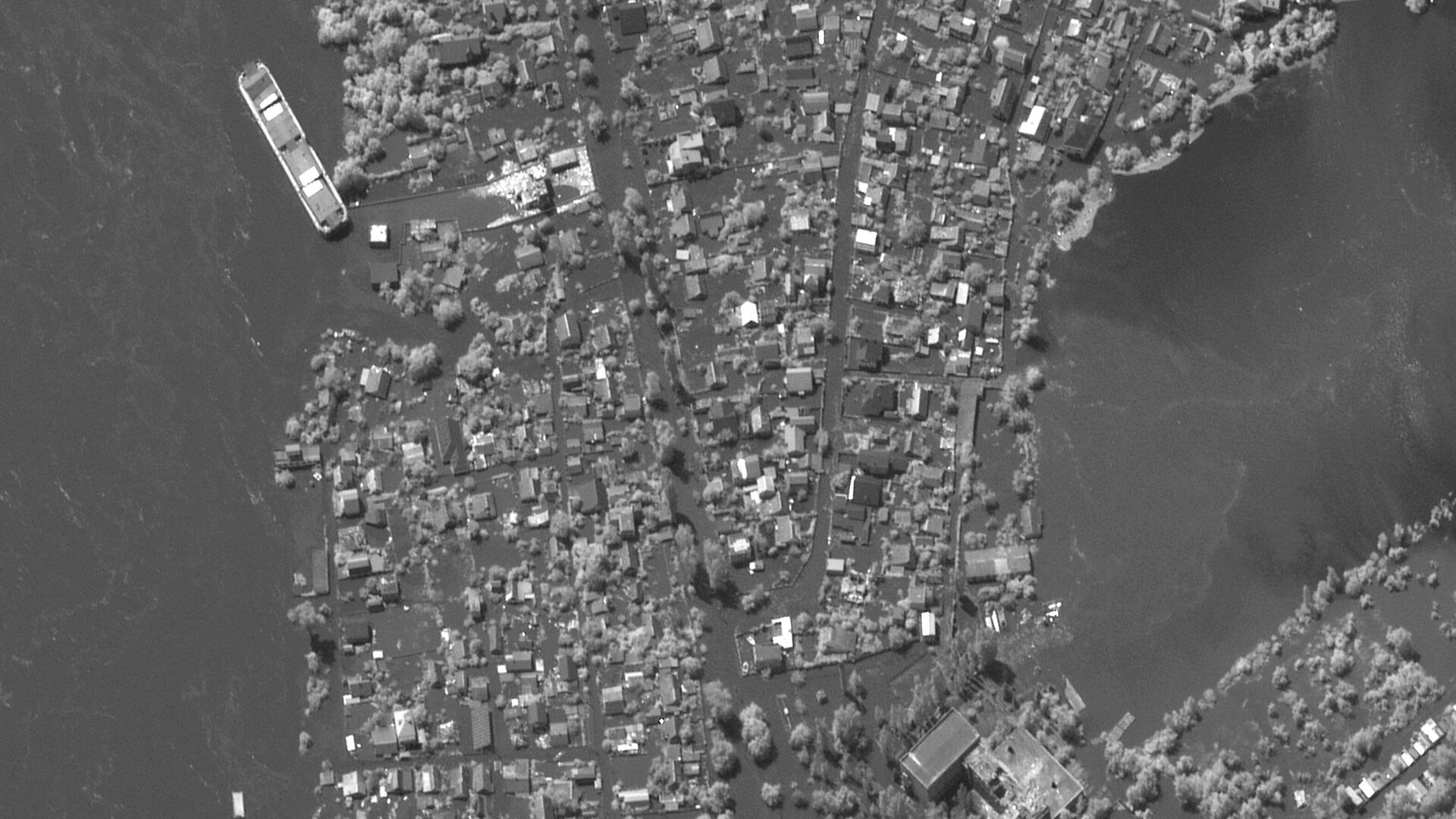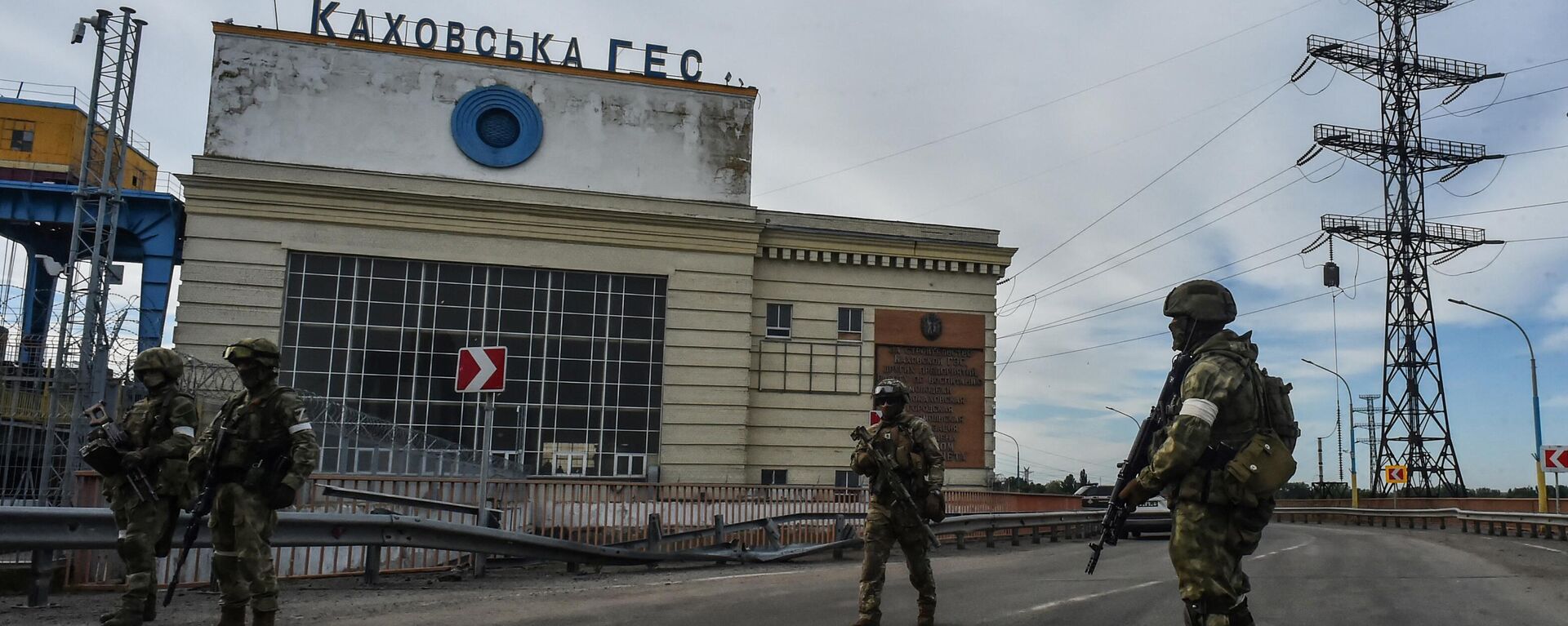https://sputnikglobe.com/20230607/iaea-chief-situation-at-kakhovka-hpp-serious-but-no-reason-for-panic-1110989251.html
IAEA Chief: Situation at Kakhovka HPP Serious But 'No Reason' for Panic
IAEA Chief: Situation at Kakhovka HPP Serious But 'No Reason' for Panic
Sputnik International
IAEA Director General Rafael Grossi told Sputnik the situation around the Kakhovka hydroelectric power plant is serious but that there is "no reason" for panic following the partial destruction of the dam and subsequent flooding.
2023-06-07T20:34+0000
2023-06-07T20:34+0000
2023-06-07T20:34+0000
world
attack on novaya kakhovka dam
alexei likhachev
russia
moscow
kiev
international atomic energy agency (iaea)
rosatom
zaporozhye npp
https://cdn1.img.sputnikglobe.com/img/07e7/06/07/1110988576_0:137:3155:1912_1920x0_80_0_0_f5ba70e99a6ca0cbba2486a2c0979ff8.jpg
"We don't want to fan flames or create panic because there is no reason for that," Grossi told Sputnik."[At] the same time, it is a serious situation. So, we don't want to downplay it implying that there is no problem here. Yes, there is a problem, because there is a decrease, a steady decrease in the level of the water."The IAEA is presently monitoring the situation around the Zaporozhye nuclear power plant (ZNPP) by following the speed of the decrease in the water level at the plant's cooling reservoir to work out possible mitigation measures that the agency would advise as a mid-term solution. "If we lose the cooling capability, you can have a meltdown, you can have some radiological consequences, on top of the fact that the reactors themselves could be damaged in a very significant way, apart from the environmental consequences that there could be," Grossi pointed out. Grossi noted that the IAEA would be working toward reinforcing its mission at the ZNPP. "We are increasing the number of experts because of two main reasons. First, of course, this unexpected situation that we have after the destruction of the dam," he said.The second reason is an effort to implement the five principles that Grossi put forward last week to ensure nuclear safety and security at the ZNPP. The principles include a ban on shelling toward and from the site and storing heavy weapons there.Grossi's remarks came as Alexey Likhachev, the director general of Russian state nuclear agency Rosatom, stated that the Zaporozhye nuclear power plant does have backup water supply options."Backup options for water supply are ready - through underground wells, through the beds of small rivers. The necessary equipment for this is also available,” Likhachev told Russian media.The upper part of the Kakhovka HPP was destroyed overnight on Monday into Tuesday. The Novaya Kakhovka city authorities later confirmed that the dam was destroyed only partially, but that it caused an uncontrollable outflow of water to towns downstream. Moscow and Kiev blamed each other for the incident. Authorities in some of the affected areas have started evacuating the population.
https://sputnikglobe.com/20230607/environment-expert-preplanned-kakhovka-dam-destruction-is-kievs-crime-against-humanity-and-nature-1110986635.html
russia
moscow
kiev
Sputnik International
feedback@sputniknews.com
+74956456601
MIA „Rossiya Segodnya“
2023
Sputnik International
feedback@sputniknews.com
+74956456601
MIA „Rossiya Segodnya“
News
en_EN
Sputnik International
feedback@sputniknews.com
+74956456601
MIA „Rossiya Segodnya“
Sputnik International
feedback@sputniknews.com
+74956456601
MIA „Rossiya Segodnya“
international atomic energy agency, kakhocka hydroelectric power plant, rafael grossi
international atomic energy agency, kakhocka hydroelectric power plant, rafael grossi
IAEA Chief: Situation at Kakhovka HPP Serious But 'No Reason' for Panic
VIENNA (Sputnik) Lenka White - International Atomic Energy Agency (IAEA) Director General Rafael Grossi told Sputnik that the situation around the Kakhovka hydroelectric power plant (HPP) is serious, but that there is "no reason" for panic following the partial destruction of the dam and subsequent flooding.
"We don't want to fan flames or create panic because there is no reason for that," Grossi told Sputnik.
"[At] the same time, it is a serious situation. So, we don't want to downplay it implying that there is no problem here. Yes, there is a problem, because there is a decrease, a steady decrease in the level of the water."
The IAEA is presently monitoring the situation around the Zaporozhye nuclear power plant (ZNPP) by following the speed of the decrease in the water level at the plant's cooling reservoir to work out possible mitigation measures that the agency would advise as a mid-term solution.
"If we lose the cooling capability, you can have a meltdown, you can have some radiological consequences, on top of the fact that the reactors themselves could be damaged in a very significant way, apart from the environmental consequences that there could be," Grossi pointed out.
"I would say, in the mid-term, not in a distant future, there could be some consequences if the situation degrades or gets worse than it is now, but we are not there yet. The situation is a serious one."
Grossi noted that the IAEA would be working toward reinforcing its mission at the ZNPP. "We are increasing the number of experts because of two main reasons. First, of course, this unexpected situation that we have after the destruction of the dam," he said.
The second reason is an effort to implement the five principles that Grossi put forward last week to ensure nuclear safety and security at the ZNPP. The principles include a ban on shelling toward and from the site and storing heavy weapons there.
"So the mission, the tasks, if you want, homework, for the team is going to be bigger. The exact number, I don't know, could be 4,5,6, it will depend on our assessment of how many people are needed for the specific functions, but we are going to be reinforcing it, yes, for sure," Grossi stated.
Grossi's remarks came as Alexey Likhachev, the director general of Russian state nuclear agency Rosatom, stated that the Zaporozhye nuclear power plant does have backup water supply options.
"Backup options for water supply are ready - through underground wells, through the beds of small rivers. The necessary equipment for this is also available,” Likhachev told Russian media.
The Kakhovka dam is the sixth and last stage of the cascade of Dnepr hydroelectric power plants located 5 kilometers from the city of Novaya Kakhovka in the Kherson Region, which became part of Russia following a referendum in September 2022.
The upper part of the Kakhovka HPP was destroyed overnight on Monday into Tuesday. The Novaya Kakhovka city authorities later confirmed that the dam was destroyed only partially, but that it caused an uncontrollable outflow of water to towns downstream.
Moscow and Kiev blamed each other for the incident. Authorities in some of the affected areas have started evacuating the population.



